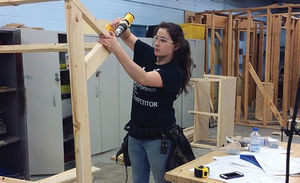Nursing Careers Can Go Beyond Hospitals
Career Opportunities Nursing is a profession known for being in demand, and may be even more so for those interested in entering the field or advancing their careers.
Though not yet widespread, the Canadian Nurses Association projects a shortage of nearly 60,000 full-time registered nurses in 2022, partly due to an aging population and a significant number of upcoming retirees. This may open up opportunities for well-paying nursing jobs for current and prospective students.
“Being a nurse in real life is nothing like how they portray it on TV. The shifts can be long and incredibly demanding,” says Dianne Martin, executive director of the Registered Practical Nurses Association of Ontario. “It’s a job that can be stressful and also very emotional. But at the same time, it can be a profoundly fulfilling and rewarding profession because you’re making a positive difference in someone’s life.”
While many nurses do work in hospital settings, they are also needed in long-term care homes, the community care sector, doctor’s offices, and a long list of other institutions including hospices and prisons. They also have to keep up with changes in health care to meet the expectations of patients and consumers.
The precedent is there, Martin adds. “Several years ago, we did a province-wide survey about the reasons for getting into the profession, and the number one reason given by eight out of 10 nurses was that they wanted to make a positive difference in the lives of others,” she says.
“Nurses not only have a direct impact on people, they also get involved in research, management, administrative roles, policy development and education”
The patients they care for are also better informed nowadays, which also means nurses must help them apply that information in appropriate ways — a role currently more dynamic and flexible than before.
“Nurses not only have a direct impact on people, they also get involved in research, management, administrative roles, policy development, and education,” says Zubeida Ramji, executive director of the CARE Centre for Internationally Educated Nurses. “We are counselling nurses to consider working in places like Kingston, Windsor, London, Kitchener, and Northern Ontario, which has always been underserved.”
Ramji adds that there are opportunities to grow and move laterally to other clinical areas that build on previous experience. The diversity in roles also extends to the illnesses and patients themselves, where working with different populations, seniors, young children, women’s reproductive health or terminal illness can each be unique.
“Nurses really have to be competent from a cultural point of view, not by just being sensitive, but also being aware that experiences related to illness or health concerns have a cultural context and definition,” she says. “That's new, and it might be different for nurses working in larger cities in Ontario than those who are working with a more homogeneous population in smaller communities.”





.jpg)















